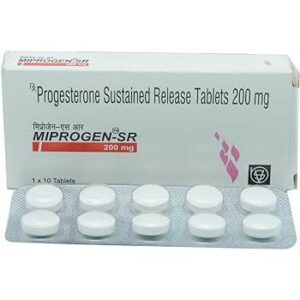PROGESTERONES + PROGESTOGENS
Progesterones: Progesterones are a class of hormones that play a vital role in the female reproductive system. They are naturally produced in the ovaries and are responsible for regulating the menstrual cycle, preparing the uterus for pregnancy, and sustaining pregnancy. However, progesterone can also be obtained as a medication for various healthcare purposes.
The use of progesterones as medication includes:
1. Hormone Replacement Therapy (HRT): Progesterone is used in combination with estrogen in hormone replacement therapy for women who have reached menopause. It helps reduce menopausal symptoms such as hot flashes and can protect the uterus from the increased risk of endometrial cancer associated with estrogen therapy.
2. Fertility Treatments: In assisted reproductive technologies like in vitro fertilization (IVF), progesterone is administered to prepare the uterus for implantation of the fertilized embryo and to support early pregnancy.
3. Birth Control: Progesterone-only contraceptive methods, such as the mini-pill, intrauterine devices (IUDs), and progesterone implants, work by thickening the cervical mucus and preventing ovulation, thus inhibiting pregnancy.
The mechanism of action of progesterones involves binding to progesterone receptors present in various tissues throughout the body. This interaction helps regulate gene expression, leading to changes in the endometrium (lining of the uterus) and cervical mucus. Progesterone also has an effect on the basal body temperature, making it a useful marker for tracking ovulation.
The dose of progesterone varies depending on the purpose of use. For hormone replacement therapy, doses range between 100-300 mg per day. In fertility treatments, progesterone is often given in the form of vaginal suppositories, gel, or intramuscular injections, with doses ranging from 25-400 mg per day. Birth control methods containing progesterone have their own specific dosing instructions.
Like any medication, progesterones can have side effects, which may include:
1. Fatigue
2. Breast tenderness
3. Nausea
4. Bloating
5. Changes in mood
6. Headaches
7. Vaginal discharge or irritation (in the case of vaginal formulations)
8. Irregular menstrual bleeding (spotting or breakthrough bleeding)
9. Allergic reactions (rare, but possible)
It is important to consult a healthcare provider before starting progesterone therapy, as they can guide you on the appropriate dosage, timing, and potential side effects specific to your situation.
Progestogens: Progestogens, also known as progestins or progesterone analogues, are synthetic hormones that have a similar function to the natural female hormone progesterone. They are commonly used in various forms of hormonal contraception, hormone replacement therapy, and to treat certain gynecological conditions.
The primary function of progestogens is to prepare the uterus for pregnancy and support the development of the embryo. They also help regulate the menstrual cycle and prevent the overgrowth of the uterine lining. In contraceptive methods, progestogens work by inhibiting ovulation, thickening the cervical mucus to prevent sperm from reaching the egg, and altering the lining of the uterus to reduce the likelihood of implantation.
The dosage of progestogens varies depending on the specific drug and its intended use. For oral contraception, a typical dosing regimen involves taking a progestogen-only pill (mini-pill) daily at the same time. The dose can range from 0.35 mg to 1 mg per pill. For hormone replacement therapy, progestogens are often combined with estrogen and administered in various forms like tablets, patches, or creams. The dose and frequency of administration will depend on the specific treatment plan and individual patient needs.
While progestogens are generally well-tolerated, they can cause certain side effects. Common side effects include breast tenderness, bloating, mood changes, irregular menstrual bleeding, and headaches. Some women may also experience changes in libido, weight gain, or acne. In rare cases, progestogens may increase the risk of blood clots, especially in individuals with pre-existing risk factors.
It’s important to note that the specific side effects and dosage recommendations can vary for different progestogens. Therefore, it is crucial to consult with a healthcare professional to determine the most suitable progestogen and dosage for an individual’s specific needs and medical history.



